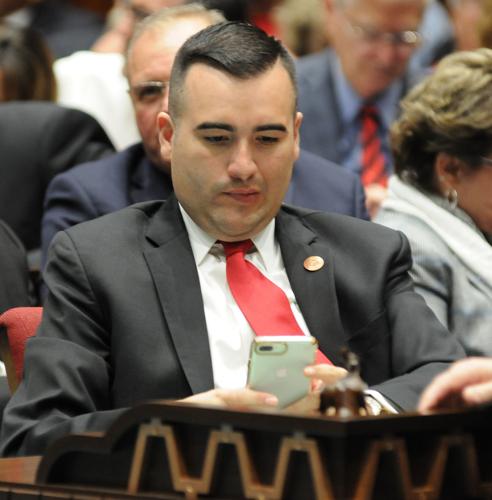PHOENIX — The Gila River Indian Community will provide the promised 500,000 acre-feet of water for the state’s drought-contingency plan after being assured that legislation the tribe opposed is dead.
In a prepared statement, tribal Gov. Stephen Roe Lewis said Rep. T.J. Shope, R-Coolidge, told him in a meeting Friday that there is no way that HB 2476 will be resurrected this year. Lewis said Shope’s guarantee is important, as he is the speaker pro-tem of the House of Representatives.
But Lewis also said that Shope told him that House Speaker Rusty Bowers, who crafted the measure the tribe found so offensive, did not intend to bring the issue up again this session.
Lewis also said House Minority Leader Charlene Fernandez and Sen. Lisa Otondo, both Yuma Democrats, also expressed their own opposition to the Bowers bill in that Friday meeting.
All that is crucial, as the Republicans control just 31 seats in the 60-member House. And with Democrats lined up in opposition to HB 2476 and Shope opposed, there is no way for the legislation the tribe finds offensive to advance.
The tribe’s action clears a crucial hurdle for the drought-contingency plan, which seeks ways to deal with the fact that Arizona’s share of Colorado River water will drop by about 18 percent next year. That is a net loss of 500,000 acre-feet of water a year, enough to supply about 1 million families.
Pinal County farmers would take the biggest hit because they are at the bottom of the pecking order.
Arizona is seeking to make up for some of that with various deals to acquire more water from other sources as well as allowing the irrigation districts that supply the farmers to drill new wells.
But the plan also was contingent on the tribe providing 500,000 acre-feet of water between next year and 2026 in exchange for $60 million in payments.
That all came into doubt when tribal officials said they would pull out of the deal if Bowers pursued his legislation, which they said would undermine their claims to water from the upper Gila River. Lewis now says he’s convinced the bill is dead and the tribe is ready to finish its part of the deal.
The tribe’s action clears a crucial hurdle to the federal Bureau of Reclamation approving the plan crafted by the seven Colorado River Basin states to decide who takes what cuts once Lake Mead reaches 1,075 feet above sea level. That is the point at which the first shortages are declared; the cuts are designed to keep the lake from going any lower and triggering further reductions.
But it still leaves in doubt whether the full plan can be ratified by the March 4 deadline set by Brenda Burman, the bureau’s commissioner.
That’s because the Imperial Irrigation District in California won’t sign its own part of the agreement until it gets $200 million in matching funds to help restore the Salton Sea, which lost its own allocation of Colorado River water a year ago. And Arizona state water officials have said that it may take longer than March 4 to get the more than a dozen internal agreements signed.
It remains unclear what Burman will do if that deadline is not met.
While HB 2476 is apparently dead, at least for this year, Bowers has made it clear the issues it raised remains.
That fight is over the state’s”use-it-or-lose-it” laws spelling out that if landowners do not use their water allocations for at least five years, they forfeit their water rights.
Bowers argued that is unfair, as there are many reasons that farmers have to quit irrigating for some period. More to the point, his legislation sought to repeal the law, a move that tribal attorney Don Pongrace said would interfere with the claims the tribe has to that water.
The issue came to a head during a hearing last week where Bowers solicited the testimony of farmers in the upper Gila River valley, all complaining that the tribal claims were denying them the right to move those historic water allocations — the one the tribe claims are forfeited — to other fields that did not have irrigation rights.
Tribal officials, in a prepared statement, said the hearing was a “show trial ... whose real purpose could only have been to somehow intimidate the Community into not enforcing its rights.”
After several hours of testimony, Bowers yanked the bill from consideration. But he left its future up in the air, suggesting that he might refine it and bring it back this year.
Lewis told Capitol Media Services at the time that the tribe’s commitment of water for the drought-contingency plan would remain off the table unless and until he was assured that the whole issue would remain dead.
The tribal governor said he now has that.
“Rep. Shope assured us he would take them back to the Legislature to help others understand why we perceived this legislation as highly inappropriate and an attack on our Community,” Lewis said in a prepared statement.
“He also provided us with very solid assurances that this legislation is truly dead and that there would be no further consideration of it, as did Rep. Fernandez,” the tribal governor continued. “Their word on this is what we need to confirm this legislation is truly not moving forward and I am pleased that the Community will be able to rejoin the State’s efforts to get DCP over the finish line.”
Fernandez sought to provide her own assurances to Lewis that what Bowers sought to do was not coming back.
“I completely understand why the Community would have viewed this bill as the attack that it was,” she said in her own statement, calling HB 2476 “not only bad policy, but an abuse of our legislative process.”







